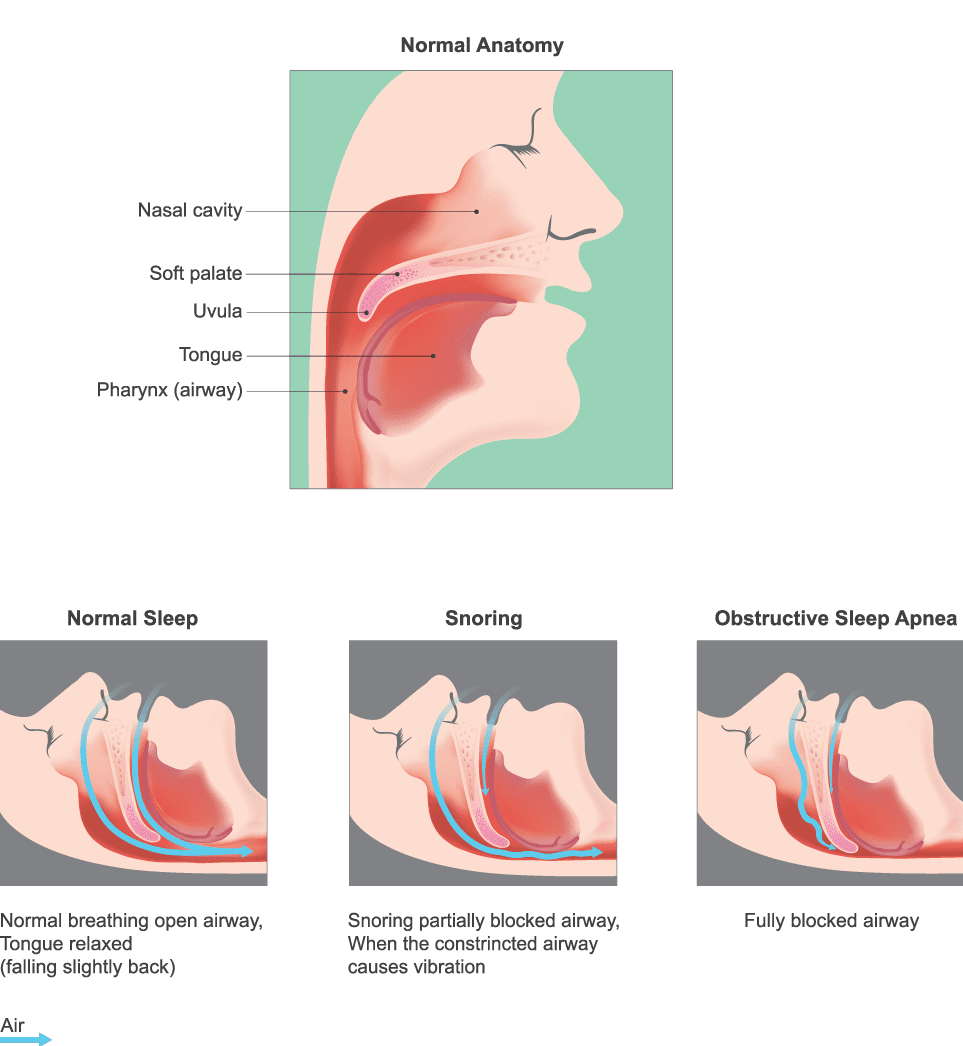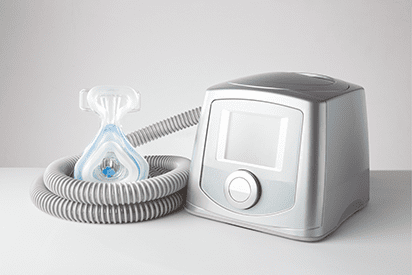What is sleep apnoea?
Sleep apnoea is a common sleeping disorder caused when your regular breathing is interrupted during sleep.
This may be either a partial, or total, temporary cessation in the ability to breathe. During the interruption to your breathing, your body is deprived of oxygen until you wake up and begin breathing again.
An apnoea event is classified as an obstruction of the airway for ten seconds or longer.
Sleep apnoea is a serious medical condition, and should not be dismissed as “just” snoring or feeling tired during the day. It can severely affect your overall health and quality of life.
During a sleep apnoea episode, sufferers will either:
- Completely stop breathing (known as an apnoea), and/or
- Have their breathing severely restricted (a hypopnea)
These events can happen hundreds of times per night.
During each breathing interruption cycle, the apnoea or hypopnea starves the body of vital oxygen and increases carbon dioxide (a waste product of breathing) levels in the blood. The lack of oxygen supply to the body signals the brain to “wake” the body to start breathing again.
Obstructive sleep apnoea (OSA)
The most common type of sleep apnoea is Obstructive Sleep Apnoea (OSA).
OSA occurs when the tongue, as well as the muscles and soft tissue at the back of the throat, relax during sleep. This causes them to collapse onto the airway, blocking the airway off.
It is estimated that 60% of snorers also suffer from OSA. They may wake up gasping for air or choking, and will experience poor quality sleep.
Luckily OSA is a treatable condition and for many patients the treatment may be as simple as wearing a dental appliance at night (which is also effective for the treatment of snoring).
What is the difference between snoring and sleep apnoea?
Not all people who snore have sleep apnoea, but most people who suffer from sleep apnoea will snore.
Whilst snoring is a common symptom of sleep apnoea, sleep apnoea snoring is different from regular snoring.

Regular snoring is the result of tissues in the back of the throat relaxing enough during sleep to partially block the airway. However, this partial blockage does not cause any significant breathing problems, and breathing is not obstructed. The snoring noise is created when air flows past these relaxed tissues, causing them to vibrate as you breathe. Depending on an individual’s anatomy and other lifestyle factors (such as alcohol consumption and body weight), the sound of the vibration may be louder or softer.
Sleep apnoea snoring is a chronic condition characterised by pauses in breathing, or shallow breaths during sleep. It is the result of a partial or full obstruction of the airway. These obstructions severely restrict or stop your breathing, and starve the body of oxygen. These obstruction periods can last from up to ten seconds, to over a minute or more, until the body is signalled to wake up and begin breathing again.
Sleep apnoea symptoms
A proper diagnosis of sleep apnoea requires a sleep study to be completed.
However, sleep apnoea can impact your health in many ways, and common symptoms include:
- Loud, persistent snoring during sleep.
- Pauses in breathing during sleep, accompanied by episodes of choking or gasping for air.
- Excessive restlessness during the night.
- Morning headaches.
- Waking up feeling unrefreshed.
- Feeling dizzy.
- Day-time sleepiness.
- Excessive sleeping during daytime hours.
- Irritability.
- Clumsiness.
- Depression, anxiety, and poor memory function.
Risk factors for sleep apnoea
There are some potential risk factors that can contribute to the likelihood of you suffering from sleep apnoea, or to the severity of your sleep apnoea.
These risk factors can include:
- Suffering from obesity / being overweight.
- Aged over 40.
- Anatomy of the face: having large tonsils, a large tongue, or small jaw.
- A nasal obstruction due to a deviated septum, allergies, or sinus problems.
- A family history of sleep apnoea.
- Already suffering from cardiovascular disease (e.g. stroke or hypertension).
- Already suffering from type 2 diabetes.
- Not getting enough sleep (being exhausted when you go to bed).
Health consequences of sleep apnoea
Sleep apnoea can severely affect your overall health and quality of life.
Research suggests it may be a contributing factor in the development of many systemic health conditions, including:
- High blood pressure / hypertension.
- Heart disease, including heart attack, atrial fibrillation (irregular heartbeat), and congestive heart failure.
- Stroke.
- Diabetes.
- Obesity (whilst obesity is a risk factor for sleep apnoea, suffering from sleep apnoea can also affect your ability to lose weight).
- Depression.
Sleep apnoea can also trigger the release of stress hormones, and change the way your body uses energy.
Dentist consultation and sleep study
If you are concerned about your snoring or worried you may be suffering from obstructive sleep apnoea, the first step is to have an initial consultation with one of our dentists.
Then we may refer you to a specialist to conduct a sleep study.
A physician will supervise your sleep study and will provide us with their results and recommendations. After your sleep study is completed, we will conduct a follow up appointment where we review the results and discuss the treatment options.
Treatment Options
There are three main treatment options for obstructive sleep apnoea. These are a dental appliance, a Continuous Positive Air Pressure (CPAP) machine, or in some cases surgery by an ear, nose and throat specialist. The appropriate treatment will depend on the cause and severity of each individual’s condition.
Dental appliance

Mild to moderate cases of sleep apnoea may be treated with a customised oral sleep appliance called a Mandibular Advancement Splint (MAS), which is fabricated by your dentist.
The appliance looks similar to a mouthguard and is worn over your teeth at night during sleep.
The appliance is designed to gently pull your lower jaw forward and provide support. The repositioning of the jaw prevents the collapse of the soft tissues at the back of the mouth, which opens the airway and stops breathing obstruction during sleep.
To create the sleep appliance, an impression of your teeth and mouth is taken. The appliance is custom-made to your own unique model, ensuring a comfortable and accurate fit.
Most patients tolerate these appliances very well and become completely comfortable sleeping with them within a few weeks.
CPAP machine


A Continuous Positive Air Pressure (CPAP) machine is made of an air pump and face mask which are joined by a tube. The device delivers air under low pressure through the mask into the nasal passages, keeping the airway open whilst sleeping.
Lifestyle improvements
In some cases, lifestyle improvements such as weight loss and the elimination of alcohol before bed may also help to improve the condition and symptoms.
Benefits of sleep apnoea treatment
Treatment of sleep apnoea has been shown to improve overall health and quality of life.
Some of these benefits include:
- Eliminated or reduced snoring
- Feeling refreshed upon waking up
- Less daytime fatigue
- Improved energy levels
- Better concentration
- Elimination or reduction in morning headaches
In conclusion
An important factor of your overall health is getting adequate, quality sleep each night.
No one is too old or too young to suffer from sleep apnoea. If you snore, or if you suspect a loved one may be suffering from sleep apnoea, make an appointment for a sleep evaluation consultation.


